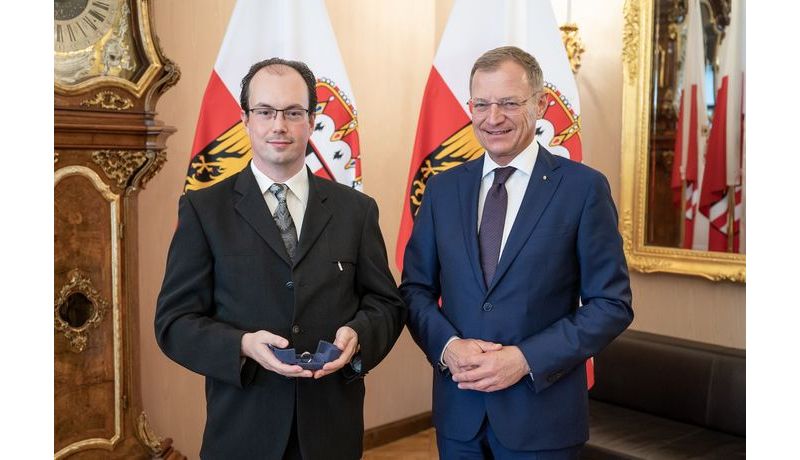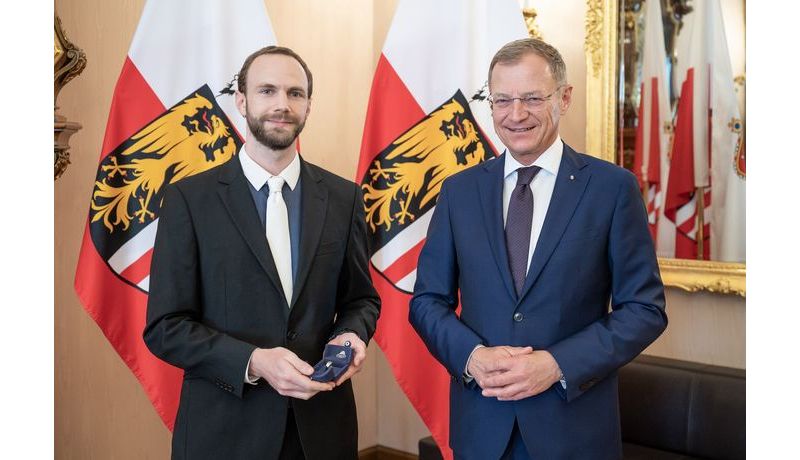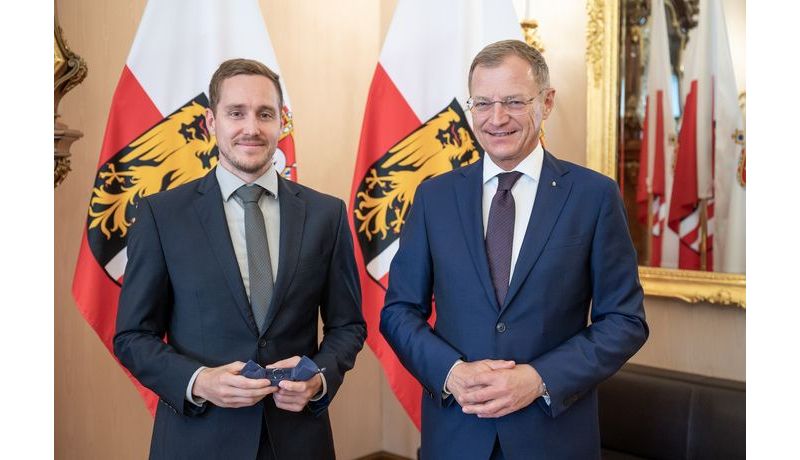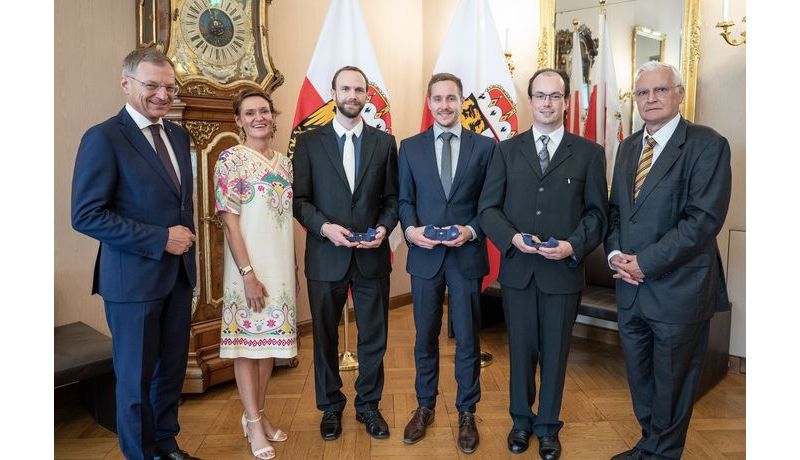Dr. DI Alwin Walter Zulehner, BSc, Dr. DI Johannes Schörgenhumer, BSc., and Dr. DI Klaus-Dieter Bauer graduated under the auspices of the Federal President and were each presented with a ring of honor.
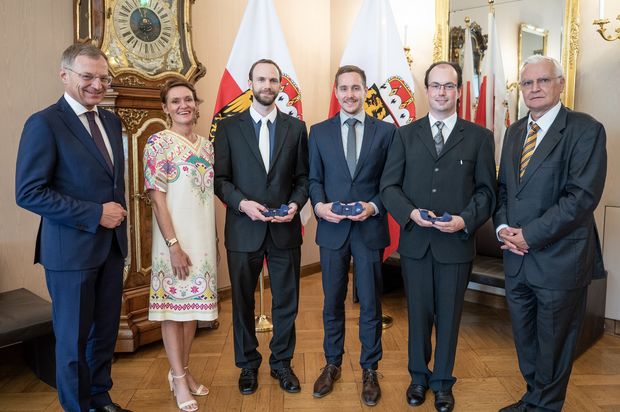
A rare distinction for three Johannes Kepler University Linz graduates:
As part of a special Promotio sub auspiciis Praesidentis rei publicae ceremony, Dr. DI Alwin Walter Zulehner, BSc, Dr. DI Johannes Schörgenhumer, BSc and Dr. DI Klaus-Dieter Bauer were each presented with a ring of honor. On behalf of Austrian President Alexander Van der Bellen, Governor Thomas Stelzer honored the graduates at the Landhaus in Linz.
Graduating as part of a sub-auspiciis doctoral graduation is the highest possible distinction for academic achievement in Austria. In order to graduate sub-auspiciis, the candidates must earn outstanding grades in all upper grade levels, pass the Matura with distinction, and earn “1s” during academic studies. As a result, not many meet the requirements and only about 20 sub-auspiciis rings of honor are awarded annually in Austria. All the more reason to be particularly pleased that three JKU graduates were awarded the distinction at once and now all carry the title ‘Doctor of Technical Sciences’.
Rector Meinhard Lukas is pleased and remarked: "Today, three of our students are receiving Austria’s highest academic award in honor of excellence in their studies. Graduating sub- auspiciis not only requires dedication and exceptional talent, but also the ability to think outside-of-the-box and excel over a number of years. In short, it takes people who are comprehensively educated and achievement-oriented. I am proud that JKU continues to bring forth exceptional individuals in so many areas."
State Governor Thomas Stelzer also stressed the awards’ impact and prestige: "Those graduating with the highest distinction of academic success are proof that JKU succeeds in balancing its growth and quality standards in terms of academic degree programs and students. An excellent university that generates highly qualified graduates is an essential factor to secure Upper Austria’s future."
Austrian President Alexander Van der Bellen congratulated the graduates in writing: "In a time of many crises, outstanding achievements in academia and science are enormously important for our country and are to be honored accordingly. Sub-auspiciis doctorates recognize achievement of this caliber, demonstrating the high quality of our universities in both research and teaching and in the way high quality student performance is encouraged."
The Distinguished Graduates
Dr. DI Klaus-Dieter Bauer remarked: "The sub-auspiciis doctorate was a strong motivation." Written already in 2019, his doctoral dissertation at the Center for Surfaces and Nanoanalytics titled "Second Harmonic Generation in Centrosymmetric Media" focused on modeling volume contributions of the quadrupole order in an effort to acquire more detailed and accurate results when examining and analyzing surfaces.
The ceremony at the Landhaus marked the end of an important stage for Dr. DI Johannes Schörgenhumer: "Receiving a ring of honor is a welcome recognition for my efforts, signifying not only to do what is required, but to always do my best." The 31-year-old from Wels earned his doctorate degree at the Institute of Organic Chemistry with his dissertation titled "From Ruthenium Catalysis over Iodine(III) Chemistry to Organocatalysis - An Adventurous Journey". In addition to new reactions involving electrophilic iodine compounds, the dissertation covers the design, synthesis, application and computational theoretical studies of new catalyst systems to use for industrial applications and phase-transfer catalyzed reactions.
Written at the Institute for Integrated Circuits, Dr. DI Alwin Zulehner's dissertation titled "Design Automation for Quantum Computing" focuses on the challenges that quantum computers present in the area of computer sciences. Quantum computers are still under development and while simulation is possible, real devices of any practical importance will remain unavailable for some time in the future. Zulehner happily remarked: "For me, earning my doctorate under the auspices of the Federal President is most certainly the highest form of recognition possible in regard to my passion for science - especially computer science".
Promotio sub auspiciis Praesidentis rei publicae
In the area of higher education in Europe, the sub auspiciis doctoral graduation is an Austrian specific award of high distinction presented to the academic and scientific elite of Austria.
Graduates from Austrian universities can only graduate under the auspices of the Federal President providing he/she has earned all “1s” beginning in upper level grades at secondary school, passed the Austrian Matura with distinction, and earned “1s” during academic studies, including the oral defense of their dissertation. The academic papers (Diploma or Master's thesis and a dissertation) must be awarded with a “1” and evaluated as "Excellent" and a certified as "academic work worthy of distinction at a university and outside of academia".
The ring of honor featuring the federal coat of arms and the inscription "sub-auspiciis Praesidentis" symbolizes this highest possible distinction for a university graduate.
Sub-auspiciis graduates receive a one-time grant of € 9,000 from the Austrian Federal Ministry of Education, Science and Research, to finance academic/scientific stays abroad, participation at conferences, and/or projects in their area of expertise over a two-year period.
 Go to JKU Homepage
Go to JKU Homepage







